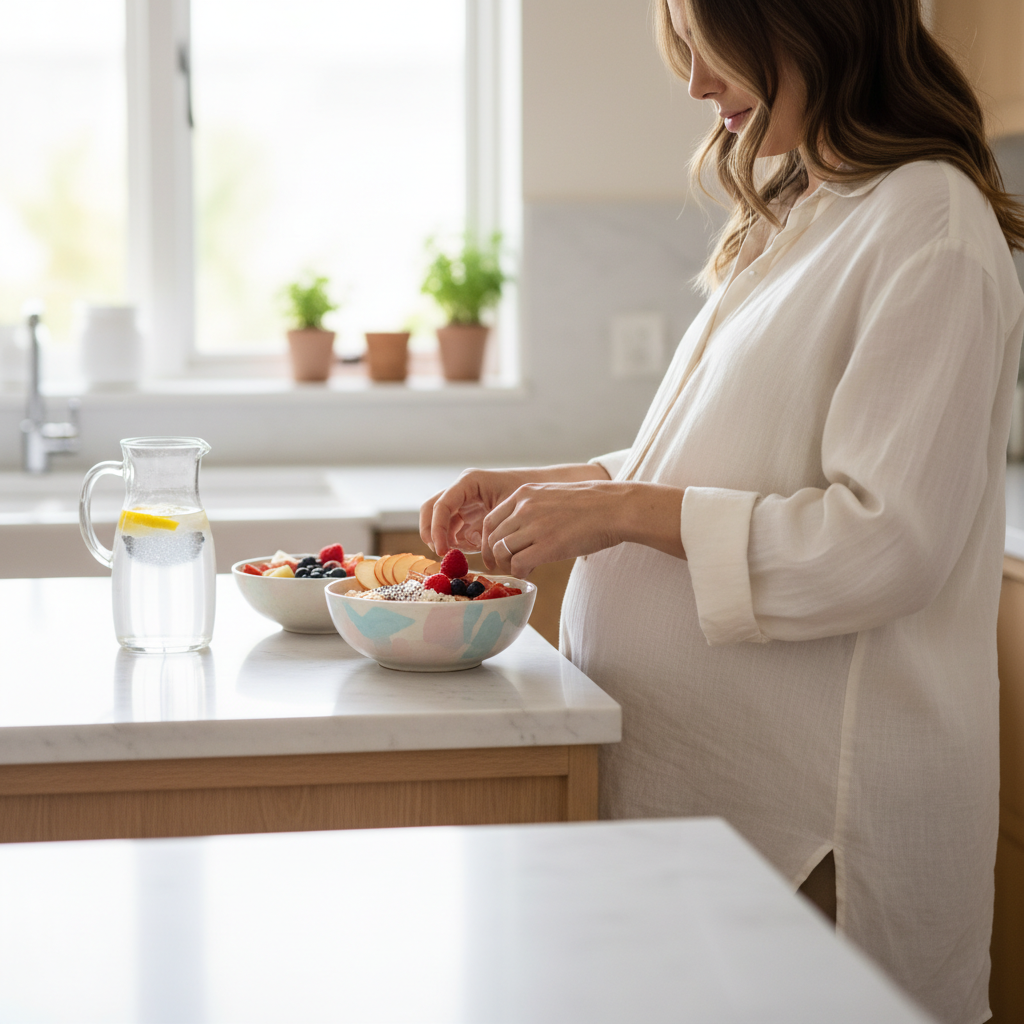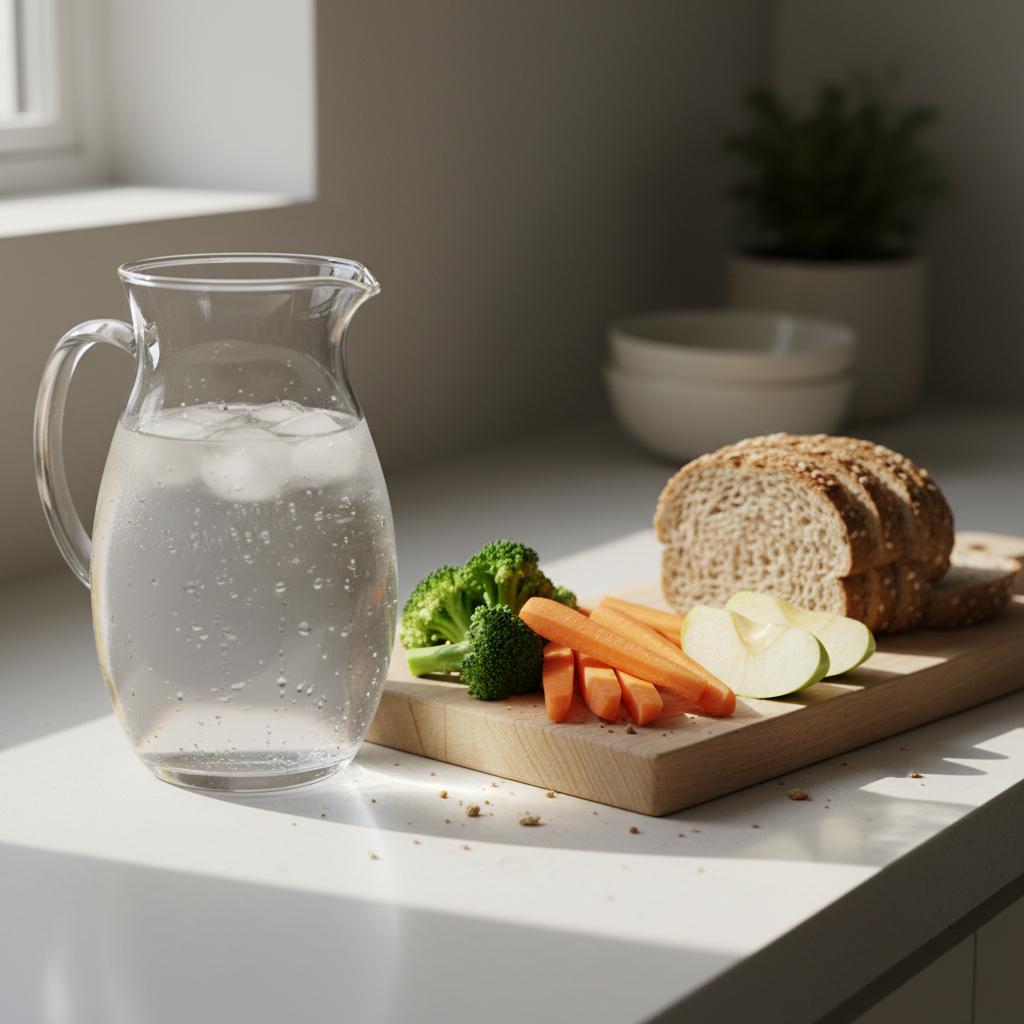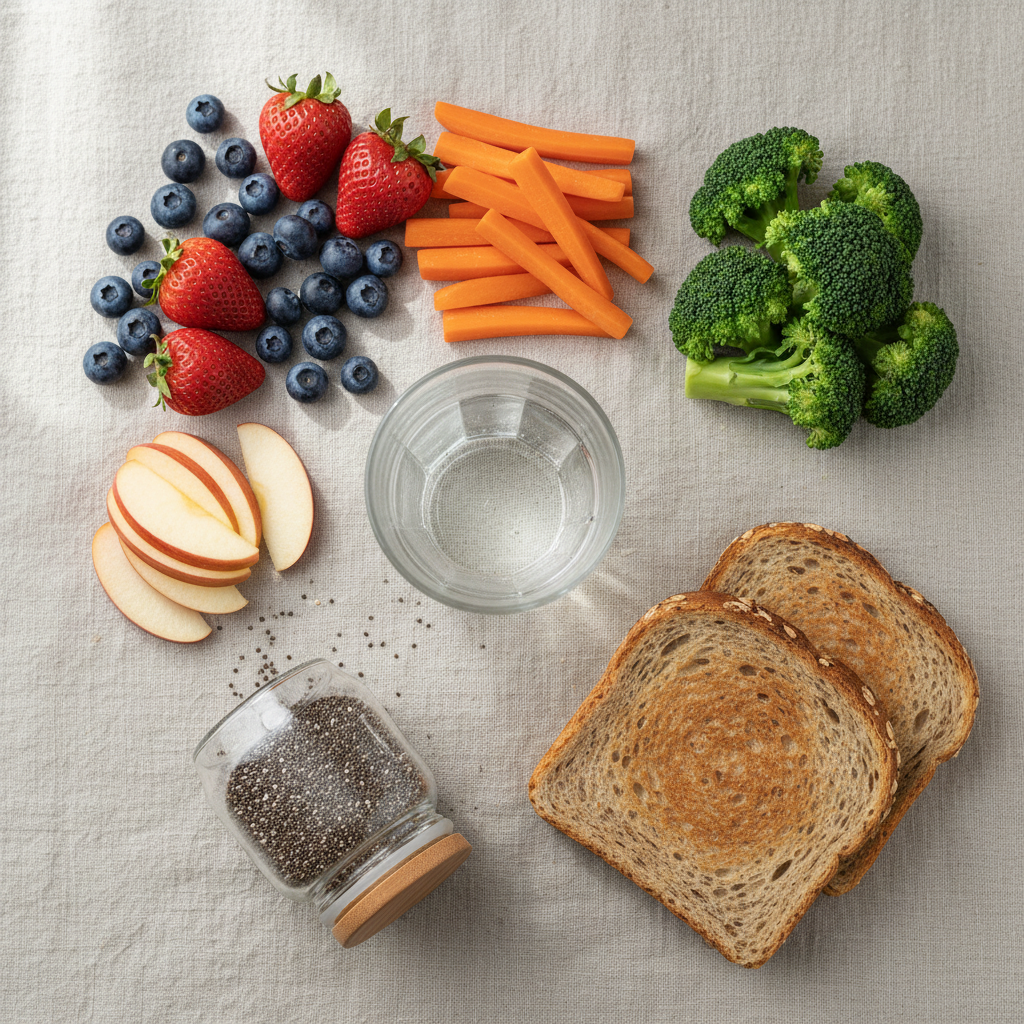
Fiber-Rich Foods to Support Digestive Health During Pregnancy
Digestive challenges are a common experience for many expectant mothers, particularly as they enter the second trimester. Incorporating fiber-rich foods into your daily diet can significantly ease these discomforts while providing essential nutrients for both you and your growing baby.
Key Highlights
Here’s what you need to know about maintaining digestive health with fiber during pregnancy:
- Most pregnant women need 25-30 grams of fiber daily to prevent constipation and support digestive health
- Fruits, vegetables, whole grains, and legumes are excellent sources of pregnancy-safe dietary fiber
- Pairing fiber-rich foods with adequate water intake maximizes their effectiveness
- Gradually increasing fiber consumption helps prevent bloating and discomfort
- Regular fiber intake can help reduce common digestive issues that may contribute to pregnancy headaches
Understanding Digestive Challenges During Pregnancy

The hormonal changes of pregnancy, particularly during the second trimester, often slow digestive transit time, leading to uncomfortable constipation. Progesterone, which relaxes the muscles of your uterus, also relaxes your intestinal muscles, making digestion less efficient than usual. This slowed digestive process, combined with your growing uterus putting pressure on your intestines, can create the perfect storm for digestive discomfort. Many women also experience changes in their food preferences or sensitivities during this time, which can further complicate maintaining a fiber-rich diet.
Why Fiber Matters During Pregnancy
Dietary fiber acts like a natural intestinal broom, helping to keep waste moving through your digestive system at a healthy pace. There are two main types of fiber that benefit pregnant women: soluble fiber, which dissolves in water and forms a gel-like substance that softens stool, and insoluble fiber, which adds bulk to stool and helps it pass more quickly through the digestive system. Together, these fibers work to prevent constipation while also supporting healthy gut bacteria, which may improve nutrient absorption for you and your baby. The American Pregnancy Association notes that adequate fiber intake can help prevent hemorrhoids, a common and uncomfortable pregnancy complication often related to constipation.
Delicious Fruits That Support Digestive Health

Fruits offer a natural and sweet way to increase your fiber intake while satisfying pregnancy cravings. Berries are fiber champions—a cup of raspberries provides about 8 grams of fiber, while also delivering vitamin C and antioxidants that support your immune system. Apples, pears, and bananas make convenient, portable snacks that offer 3-5 grams of fiber each when eaten with their skins (when applicable). For a tropical treat, try papaya, which contains a natural enzyme called papain that can aid digestion, or kiwi, which provides about 2 grams of fiber per fruit along with more vitamin C than an orange. Including a variety of fresh, frozen, or dried fruits (without added sugars) throughout your day can help you reach your fiber goals while providing essential vitamins for pregnancy health.
Vegetables That Do Double Duty
Vegetables are powerhouse foods during the 2nd trimester, offering both fiber and crucial nutrients for your baby’s development. Dark, leafy greens like spinach, kale, and collard greens provide iron and folate alongside fiber, supporting both digestive health and your baby’s neural development. Broccoli and Brussels sprouts contain around 5 grams of fiber per cup and are rich in vitamin K, which helps blood clotting and bone development. Carrots, sweet potatoes, and pumpkins provide both soluble and insoluble fiber while delivering beta-carotene, which your body converts to vitamin A for healthy skin, vision, and immune function. According to the Academy of Nutrition and Dietetics, aiming for at least 2.5 cups of vegetables daily will help meet both your fiber and nutrient needs during pregnancy.
Grains and Legumes: Fiber Powerhouses

Whole grains and legumes provide substantial fiber that can help prevent pregnancy headaches second trimester by maintaining stable blood sugar levels. Oats are particularly beneficial, offering about 4 grams of fiber per cup while providing B vitamins that support your baby’s cellular development. Brown rice, quinoa, and barley make excellent bases for meals, each providing 3-6 grams of fiber per cooked cup while delivering complex carbohydrates for sustained energy. Legumes such as lentils, chickpeas, and black beans are fiber superstars, with most varieties providing 10-15 grams per cooked cup, plus protein and iron—nutrients particularly important during the second trimester when your blood volume increases dramatically. Incorporating these foods into your diet through soups, salads, and grain bowls can significantly boost your daily fiber intake.
Simple Ways to Boost Your Daily Fiber Intake
Making small, consistent changes to your eating habits can help you achieve optimal fiber intake without overwhelming your system. Start your day with fiber-rich breakfasts like overnight oats topped with berries and chia seeds, which can provide nearly a third of your daily fiber needs in one meal. When preparing meals, choose whole grain versions of pasta, bread, and rice over refined options to easily add 2-3 grams of fiber per serving. Adding legumes to soups and salads or replacing half the meat in recipes with beans or lentils increases both fiber and plant-based protein. For snacks, keep fiber-rich options readily available—hummus with vegetables, apple slices with almond butter, or a small handful of dried fruit and nuts can satisfy hunger while supporting digestive health during the 2nd month pregnancy and beyond.
The Water Connection
Fiber works best when paired with adequate hydration, making water intake a crucial component of your digestive health strategy. During pregnancy, your body needs extra fluids—about 8-10 cups daily—to support increased blood volume, amniotic fluid production, and efficient waste elimination. Without sufficient water, fiber can actually worsen constipation by creating dry, hard-to-pass stool. Keeping a reusable water bottle with you throughout the day serves as both a reminder and convenience for staying hydrated. If plain water becomes unappealing, try infusing it with cucumber, berries, or citrus fruits for natural flavor without added sugars. Herbal teas (pregnancy-safe varieties) and clear broths also contribute to your daily fluid intake while providing warmth and comfort, especially welcome during the sometimes challenging second trimester.
Putting It All Together: A Sample Fiber-Rich Day
Creating a balanced, fiber-rich eating plan doesn’t require complicated recipes or unusual ingredients. A practical approach might include a breakfast of whole-grain toast with avocado and a sliced kiwi (approximately 8g fiber), a mid-morning snack of Greek yogurt topped with berries and ground flaxseed (4g fiber), and lunch featuring a colorful salad with mixed greens, quinoa, chickpeas, and vegetables (10g fiber). For afternoon hunger, a small apple with almond butter (4g fiber) provides satisfying energy, while dinner might include brown rice, grilled chicken, and roasted broccoli (6g fiber). This sample day provides around 32 grams of fiber—meeting the recommended intake for pregnancy—while offering variety and essential nutrients. Remember that your specific needs may vary based on your pre-pregnancy diet and current health status, so gradually work up to higher fiber intake if you’re not accustomed to it.
Supporting Your Digestive Health Throughout Pregnancy
Making fiber-rich food choices is a simple yet powerful way to support your body’s changing needs during pregnancy. By gradually incorporating a variety of fruits, vegetables, whole grains, and legumes into your diet—along with plenty of water—you can help manage common digestive discomforts while providing optimal nutrition for both you and your baby. Remember that while dietary changes can significantly improve digestive health, persistent or severe symptoms should always be discussed with your healthcare provider to ensure appropriate care throughout your pregnancy journey.
